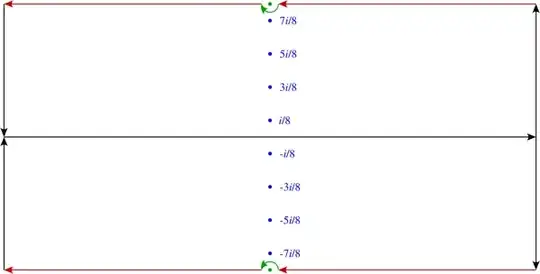You can use Parseval's theorem, which states that, given two functions $f(x)$ and $g(x)$, each having Fourier transforms $\hat{f}(k)$ and $\hat{g}(k)$, respectively (and satisfying certain integrability conditions that are satisfied here), the following relation holds:
$$\int_{-\infty}^{\infty} dx \, f(x) g^*(x) = \frac{1}{2 \pi} \int_{-\infty}^{\infty} dk \, \hat{f}(k) \, \hat{g}^*(k)$$
where * is complex conjugation. Here, $f(x) = \text{sech}{(\pi x)}$ and $g(x) = (16+x^2)^{-1}$. The FT $\hat{g}(k)$ is very well known and I will not go into detail here about it:
$$\hat{g}(k) = \frac{\pi}{4} e^{-4 |k|}$$
The FT $\hat{f}(k)$, on the other hand, is not as well known, but should be, as it is form-preserving. To maintain the flow of this derivation, I will hold off on the derivation of the following until later:
$$\hat{f}(k) = \text{sech}{(k/2)}$$
Let $I$ be the original integral. Obviously, the integrand of $I$ is even and we may therefore extend the integration interval to the entire real line. Thus
$$\begin{align}I &= \frac14 \int_{-\infty}^{\infty} dx \,\frac{\text{sech}{(\pi x)}}{16+x^2}\\ &= \frac{1}{8 \pi} \int_{-\infty}^{\infty} dk \, \text{sech}{\frac{k}{2}} \frac{\pi}{4} e^{-4 |k|}\\ &=\frac{1}{16} \int_{-\infty}^{\infty} dk \frac{e^{-4 |k|}}{e^{k/2}+e^{-k/2}} \\ &= \frac18 \int_0^{\infty} dk \frac{e^{-9 k/2}}{1+e^{-k}}\\&=\frac18 \sum_{m=0}^{\infty} \frac{(-1)^m}{m+\frac{9}{2}}\end{align}$$
Let
$$S = \sum_{m=0}^{\infty} \frac{(-1)^m}{m+\frac{9}{2}}$$
We may evaluate this sum using the residue theorem. Note that
$$\sum_{m=-\infty}^{\infty} \frac{(-1)^m}{m+\frac{9}{2}} = 2 S + 4 \left (1-\frac13+\frac15-\frac17\right)$$
By the residue theorem, the sum on the left is simply
$$-\operatorname*{Res}_{z=-9/2}[ \pi \, \csc{\pi z}] = \pi$$
Therefore the integral is
$$\int_0^{\infty} \frac{dx}{\left (e^{\pi x}+e^{-\pi x}\right) (16+x^2)} = \frac{S}{8} = \frac{\pi}{16}-\frac{19}{105} \approx 0.015397$$
ADDENDUM
The FT of $\text{sech}{(\pi x)}$ may also be derived using the residue theorem. We simply set up the integral as usual and comvert it into a sum as follows:
$$\begin{align}\int_{-\infty}^{\infty} dx \, \text{sech}{(\pi x)} \, e^{i k x} &= 2 \int_{-\infty}^{\infty} dx \frac{e^{i k x}}{e^{\pi x}+e^{-\pi x}}\\ &= 2 \int_{-\infty}^0 dx \frac{e^{i k x}}{e^{\pi x}+e^{-\pi x}} + 2 \int_0^{\infty}dx \frac{e^{i k x}}{e^{\pi x}+e^{-\pi x}}\\ &= 2 \sum_{m=0}^{\infty} (-1)^m \left [\int_0^{\infty}dx \, e^{-[(2 m+1) \pi+i k] x} +\int_0^{\infty}dx \, e^{-[(2 m+1) \pi-i k] x} \right ] \\ &= 2 \sum_{m=0}^{\infty} (-1)^m \left [\frac{1}{(2 m+1) \pi-i k} + \frac{1}{(2 m+1) \pi+i k} \right ]\\ &= 4\pi \sum_{m=0}^{\infty} \frac{(-1)^m (2 m+1)}{(2 m+1)^2 \pi^2+k^2}\\ &= \frac{1}{2 \pi}\sum_{m=-\infty}^{\infty} \frac{(-1)^m (2 m+1)}{\left (m+\frac12\right)^2+\left(\frac{k}{2 \pi}\right)^2} \end{align}$$
By the residue theorem, the sum is equal to the negative sum of the residues at the non-integer poles of
$$\pi \csc{(\pi z)} \frac{1}{2 \pi}\frac{2 z+1}{\left ( z+\frac12\right)^2+\left (\frac{k}{2 \pi}\right)^2}$$
which are at $z_{\pm}=-\frac12 \pm i \frac{k}{2 \pi}$. The sum is therefore
$$-\frac12\csc{(\pi z_+)} - \frac12 \csc{(\pi z_-)} = -\Re{\left [\frac{1}{\sin{\pi \left (-\frac12+i \frac{k}{2 \pi}\right )}}\right ]} = \text{sech}{\left ( \frac{k}{2}\right)}$$
